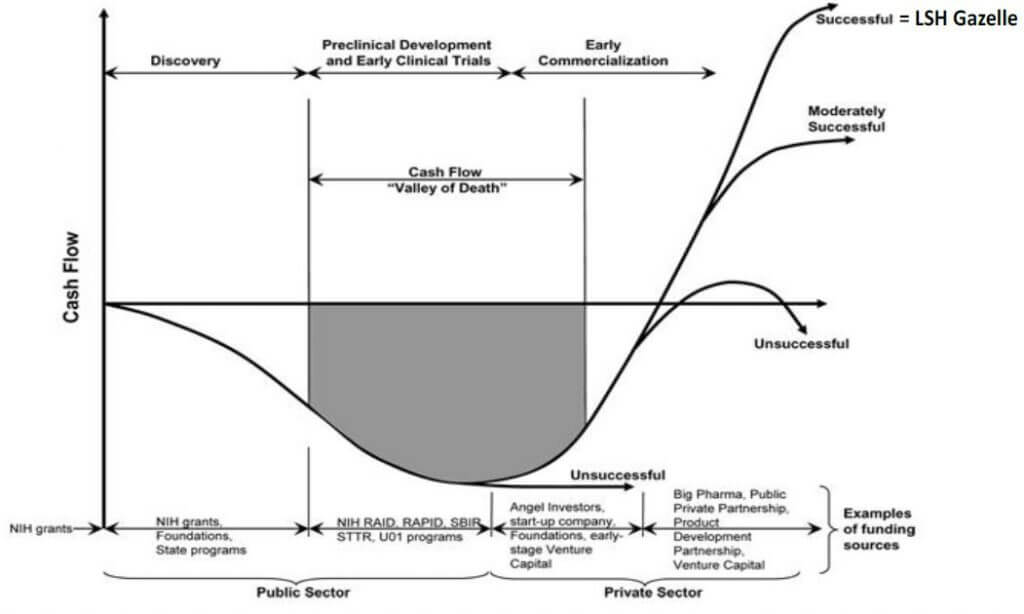The European Life Sciences and Health (LSH) sector is demonstrating great results with respect to valorisation of scientific research through start-up companies at the level of local ecosystems. However, the growth prospects of most newly founded firms are low and raising these start-up companies to be LSH Gazelles is found to be difficult. As an example, figure 1 shows that the biotechnology industry (part of the LSH sector) is lagging behind in the share of gazelles, compared to other industries.

The probability that new firms survive the first years of their existence, and that firms which actually survive experience strong growth rates, is small. Many start-ups never turn into a successful business: they are either unsuccessful or moderately successful which is a threat to Europe’s innovation capacity.

Growth of a start-up company into a LSH Gazelle requires well-equipped LSH entrepreneurs: people with knowledge of the sector, excellent entrepreneurial skills and competences, and access to a large, supportive private-public network. The problem is that the EU LSH sector is confronted with a structural shortage of such experienced and well-equipped LSH entrepreneurs and this is putting a strain on the innovation capacity in higher education, business and the overall socio-economic environment. The root of this problem is the current entrepreneurial education system.
Firstly, the current educational system is not designed to provide LSH experts with entrepreneurial skills and competences for growth. There are many programmes for establishing start-up companies, but there are only few programmes that really support the development of innovation and entrepreneurial business skills necessary to raise LSH Gazelles (high-growth companies).
Secondly, research has shown that the level of application (learning on the job) is very low (European Commission, March 2012), whereas real-life examples and experiences are seen as essential learning elements for students (ECOTEC / European Commission, March 2010).
Thirdly, the strong local ecosystem of start-up entrepreneurs is not sufficient to realize high growth. A large network is required in order to have access to investors, role models and markets. The local ecosystem should be replaced by European collaborations.
In order to address these aspects there is a need for:
New, innovative and multidisciplinary approaches to teaching and learning (more action-based, focus on entrepreneurial growth)
Entrepreneurial mind-set and skills (cooperation with enterprises and practical application of skills)
Exchange of knowledge (between higher education, enterprises and government)
Entrepreneurial competences in the LSH sector
The need for more specific and more elaborate entrepreneurial competences in the LSH sector is identified as an important hurdle for start-ups to become Gazelles.
The educational building blocks will provide the potential Gazelles in the different LSH ecosystems in Europe with the necessary knowledge and practical and transversal skills such as entrepreneurial personal leadership skills. The report on the entrepreneurial competences in the LSH sector will ensure that the knowledge and skills taught in the building blocks are spot-on. The venture assessment tool will enable the LSH Gazelles to assess the progress of their venture in a structured way. The EU LSH GROWTH platform will enable the LSH ventures to exchange knowledge and expertise and provides access to relevant stakeholders and resources. These tools will ensure that the need of the LSH industry for entrepreneurial knowledge and skills is met and it is expected that in the long run the percentage of Gazelles in LSH industry will increase.
Innovative and multidisciplinary approaches to teaching and learning
The way to successfully reach the LSH business community is via jointly developed innovative and multidisciplinary approaches to teaching and learning. The educational building blocks that will be developed in the project are all innovative and multidisciplinary approaches to teaching and learning that will enhance the exchange of knowledge between the public and private sector.
